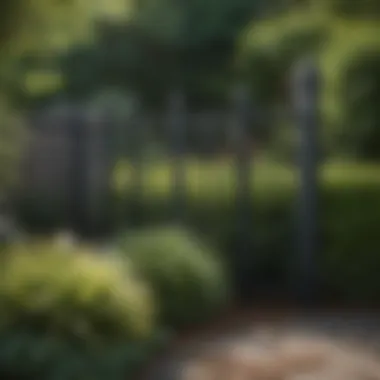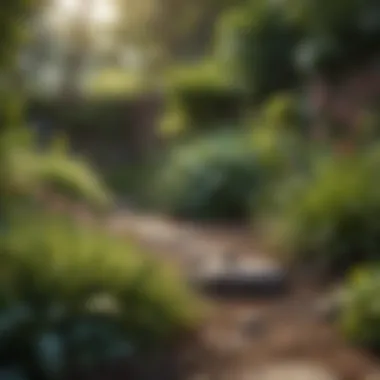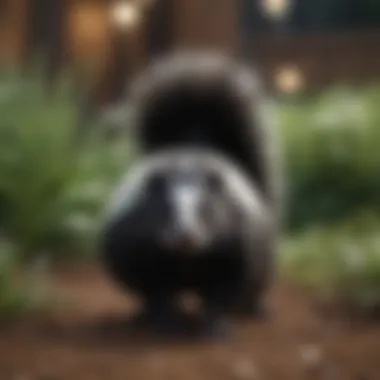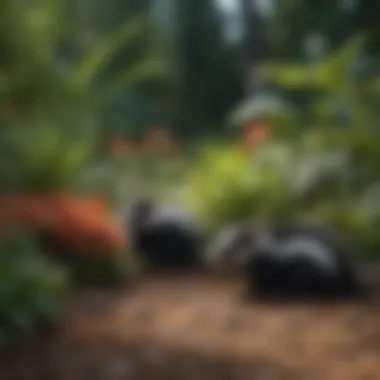Effective Strategies to Prevent Skunk Intrusion


Intro
Creating a garden that flourishes and invites wildlife is a common ambition among homeowners. However, the intrusion of skunks presents a challenge. Skunks are often attracted to gardens due to the easy access to food sources and shelter. This article aims to provide effective strategies for preventing skunk intrusion while maintaining an aesthetically pleasing garden environment.
Understanding skunk behavior is crucial. Skunks are nocturnal animals, which means they are mostly active at night. They predominantly feed on insects, fruits, and small rodents. By analyzing their habits, homeowners can implement effective deterrents. This discussion will cover various strategies to keep skunks away, grouped into understanding environmental factors, preventive measures, and recommended deterrent products.
Not only does this guide target individuals interested in gardening, but it also reaches landscape enthusiasts who wish to safeguard their design efforts. By examining the intricate dynamics of the skunk's habits, readers can make informed decisions that result in a serene and harmonious outdoor space.
Understanding Skunk Behavior
To effectively prevent skunks from intruding into gardens, homeowners must first understand skunk behavior. Skunks are nocturnal animals, primarily active during the night. Their habits and instincts dictate how they interact with residential areas. Understanding these behaviors allows you to identify when and why skunks are attracted to your garden.
Diet and Feeding Habits
Skunks are omnivores, meaning their diet consists of both plant and animal matter. Common food sources include insects, fruits, vegetables, and even small vertebrates. Homeowners often unknowingly provide potential food sources, making their yards more appealing. For example, ripe fruits that fall from trees or unsecured pet food can attract skunks. Thus, being aware of their dietary preferences is crucial for preventing skunk intrusion. If you eliminate these food sources, the chance of skunks visiting decreases significantly.
Breeding Patterns
Skunks breed once a year, typically in late winter to early spring. This period can lead to increased skunk activity in search of food and shelter for their offspring. Understanding their breeding patterns helps in anticipating heightened skunk presence during these months. Female skunks are particularly vulnerable, as they need a secure environment for raising young. By learning about and observing these seasonal changes, homeowners can take preemptive actions to deter skunks during breeding times.
Territorial Instincts
Skunks are territorial animals. They mark their territory using scent, which indicates to others that an area is occupied. If your yard is near a hillside or forest, skunks might see it as an extension of their territory, especially if there are suitable shelters like dense shrubs or rock piles. Understanding these territorial instincts can help you modify your garden. Creating barriers or changing the landscaping could disrupt their claims, making your yard less appealing for habitation.
Understanding skunk behavior is not just helpful; it's essential for effective prevention. The more homeowners know about skunks, the better equipped they are to keep them away.
Assessing Your Yard
Assessing your yard is a critical first step in preventing skunk intrusion. Understanding the unique characteristics of your garden allows you to identify specific aspects that may attract skunks. This proactive approach not only keeps your plants safe, but it also helps maintain a peaceful environment. The following subsections will delve deeper into identifying potential attractants, evaluating landscape design, and examining trash areas.
Identifying Potential Attractants
Skunks have a keen sense of smell, which they use to locate food sources. Recognizing what might attract them is vital in your assessment. Common attractants include:
- Insects: Many homeowners unknowingly provide a buffet for skunks by allowing insect populations to thrive. Grubs and other insects found in the soil can draw them in.
- Food Scraps: Leftover food from outdoor meals can be appealing. Ensure any food waste is properly disposed of, or better yet, refrain from leaving it outside.
- Fruit Trees: If you have fruit trees in your garden, fallen fruit can be a magnet. Regularly clean up any fallen fruit to reduce the temptation for skunks.
- Pet Food: Leaving pet food outside, even for a short while, can invite unwanted guests. Always bring in pet food after feeding.
By identifying these potential attractants, you create a less inviting space for skunks, thereby enhancing your yard's defenses.
Evaluating Your Landscape Design
The overall design of your garden significantly impacts wildlife encounters. A well-planned landscape can deter skunks. Here are some elements to consider:
- Dense Ground Cover: Dense bushes and overgrown plants provide shelter for skunks. Regular maintenance to trim back excessive growth can make your garden less appealing.
- Open Spaces: Maintaining clear areas in your yard can reduce skunks' sense of security. When they have fewer places to hide, they are less likely to settle.
- Raised Garden Beds: Using raised garden beds can acts as a barrier to skunks reaching your plants. It also makes it harder for them to dig through for food.
- Water Features: Skunks may be drawn to sources of standing water. Ensure bird baths and other water features are regularly monitored and cleaned.
Each element of your landscape design can influence whether skunks will find your yard hospitable or not.
Examining Trash and Compost Areas
Trash and compost are often overlooked but can be significant factors in attracting skunks. To minimize this risk, consider the following:
- Secure Trash Cans: Use cans with tight-fitting lids. If possible, store them in a secure shed or garage to prevent access.
- Compost Management: If you compost, be aware of what you add. Avoid including meat or dairy, which can draw skunks. Maintain your compost to ensure it does not become a skunk magnet.
- Regular Cleanup: Keep the area around your trash and compost clear of any spills or scraps. Even small amounts of food waste can attract skunks.
By actively examining and managing these areas, you can significantly reduce the chances of skunks intruding upon your garden.
"A well-maintained yard is not just aesthetically pleasing; it is also less likely to attract unwanted wildlife."


Through careful assessment, homeowners can create a skunk-resistant environment that fosters a harmonious outdoor area.
Creating a Skunk-Resistant Environment
Creating a skunk-resistant environment is essential for maintaining a peaceful garden space. This section outlines specific strategies that minimize the likelihood of skunk visits. Effective prevention can significantly reduce potential damage and undesirable odors associated with skunk intrusions.
One main focus involves how the physical layout and components of your yard can either attract or repel skunks. A garden that appears inviting and offers shelter is more likely to attract these creatures. Therefore, it is crucial to make the environment less appealing.
Choosing Appropriate Fencing
Fencing acts as a primary barrier against skunk entry. The height and sturdiness of the fence are factors to consider. A fence should ideally be at least three to four feet tall to deter skunks. Installing it securely into the ground is also vital, as skunks are known to dig. The fence should extend underground by at least one foot. This will prevent skunks from burrowing beneath. Materials like wood, chain-link, or vinyl fencing can work effectively.
Additionally, ensure there are no gaps or weak spots along the fence. Regular maintenance is necessary to protect against wear and tear which might create openings. Some homeowners find it helpful to add a fence topper, such as a rolled section of barbed wire, which can further deter larger animals, including skunks.
Securing Garbage and Food Sources
Securing food sources is equally critical. Skunks are opportunistic feeders, attracted to easily accessible food. This often includes garbage can contents, pet foods, and garden produce. Using skunk-resistant trash containers is a wise investment. These should feature tight-fitting lids to minimize smells that lure skunks in.
For those who compost, it is also advisable to contain smells by using a sealed compost bin rather than an open pile. This reduces food odors that can attract not only skunks but also other wildlife. Additionally, if you have pets, feed them indoors and avoid leaving food outside.
Maintaining Yard Cleanliness
Maintaining cleanliness in the yard is not only about aesthetics but also about preventing skunk attraction. Regularly picking up fallen fruits and vegetables, cleaning garden beds, and disposing of food waste promptly is essential.
Consider using natural repellents, which can be sprinkled around areas that may invite skunks. These include substances like cayenne pepper or predator urine, which skunks naturally avoid.
Keeping a tidy yard can make a huge difference in your efforts to keep skunks away. A well-maintained garden is less likely to attract unwanted visitors.
Deterrent Measures
Deterrent measures are crucial for maintaining a peaceful garden environment. These strategies not only help in keeping unwanted skunks at bay but also contribute to the overall health of your outdoor space. By understanding how to create an unfriendly atmosphere for skunks, homeowners can reduce the likelihood of intrusion, thus safeguarding plants and spaces from their potentially destructive habits.
Natural Repellents
Natural repellents are a favored choice among many gardeners due to their eco-friendly nature. These substances can effectively deter skunks without the use of harsh chemicals. Common natural repellents include cayenne pepper, garlic, and vinegar. Sprinkling cayenne pepper around the garden can create a pungent barrier that skunks dislike. Similarly, garlic sprays can be applied to areas where skunks might enter.
Also, vinegar serves as a strong odor deterrent. Both cayenne and garlic have been reported to have effects that last a few days, requiring repeated applications after rain or watering.
Natural repellents can often be a simple, low-cost solution to deter skunks while being kind to the environment.
Commercial Skunk Repellents
In addition to natural options, commercial skunk repellents are widely available and can offer powerful deterrence. These products are usually designed with specific scents or tastes that are aversive to skunks. Products like Critter Ridder or Havahart utilize ingredients that smell unpleasant to skunks, thus keeping them at bay.
When selecting a product, consider the area of application—some repel based on scent, while others may include granules for spread over various terrains. Furthermore, the effectiveness often hinges on local wildlife behavior.
Always follow the instructions carefully for maximum effectiveness. Regular reapplication is important, especially during peak seasons for skunk activity.
Utilization of Motion-Activated Devices
Motion-activated devices can provide a reliable layer of protection against skunks. These devices, which can range from simple lights to full sprinkler systems, rely on sudden movements to scare away skunks. For example, motion-activated sprinklers release a burst of water when an animal approaches, startling them and forcing them to leave.
Alternatively, ultrasonic devices emit sounds that are unpleasant to skunks, effectively deterring them from entering your garden. These measures can be particularly useful in areas prone to skunk activity.
Investing in motion-activated technology can yield long-term benefits by fostering a more secure garden environment.
Engaging Professional Services


In the realm of garden maintenance, engaging professional services can be seen as a vital component for managing skunk intrusions. While many homeowners may attempt to resolve the issue on their own, the complexities involved often necessitate professional intervention. Expert services not only bring experience but also a tailored approach that could be essential for effective skunk control.
Hiring wildlife removal professionals offers a multitude of benefits. First, they have a comprehensive understanding of local wildlife behavior, including skunks. These experts can efficiently identify patterns that a homeowner might overlook, such as burrows or common entry points. Their training enables them to use the appropriate methods without harming the skunks or disrupting the ecosystem.
Additionally, engaging professionals reduces the risk of injury. Attempting to remove wildlife without the necessary skills can be dangerous. Many homeowners underestimate the defensive mechanisms of skunks, which can lead to potential sprays or bites. Thus, prioritizing safety is crucial.
Furthermore, professional services often provide ongoing support. They can help in creating long-term strategies to prevent future skunk visits. This includes scheduling regular assessments of the yard and providing guidance on effective yard management. Investing in these services can ultimately save time, money, and stress.
"It is always wise to call the pros when you are uncertain about how to deal with wildlife problems."
When to Call a Wildlife Removal Expert
Recognizing when to call a wildlife removal expert is an essential skill for homeowners. If skunks are frequently visiting your garden, despite your best efforts to implement preventive measures, it may be time to seek professional help. Signs of regular skunk activity include visible diggings, an unpleasant odor, and nighttime sightings.
Additionally, if you encounter a skunk that seems unusually aggressive or sick, contacting professionals immediately is important. They have the resources to evaluate the skunk's health and the risks it may pose to pets or children in the area.
A wildlife expert can assist beyond just removal. They can provide information about the broader habitat interaction and recommend strategies to create a more skunk-resistant environment. For example, this might include landscaping changes or enhanced fencing options.
Understanding Humane Trapping
One of the primary methods used by professionals for skunk control is humane trapping. It is a practice that emphasizes the well-being of the animal while addressing the concerns of property owners. Humane traps are designed to safely capture skunks without causing harm.
When using humane trapping, it's critical to select traps that are appropriate in size and design. Professionals can ensure that the traps are correctly placed and monitored, maximizing efficiency and avoiding unnecessary stress for the skunk. They will also take care of the logistics involved in relocating the captured skunk, adhering to local wildlife laws.
Proper education on how traps function can be invaluable for homeowners considering this method. Experiencing the emotional distress of seeing a trapped skunk can drive individuals to act rashly. Instead, understanding the humane trapping process can foster patience and encourage a more thoughtful response.
Lastly, engaging a professional service for humane trapping demonstrates commitment not only to your garden's safety but also to ethical treatment of wildlife. This balance is crucial for individuals who value nature and seek harmony between their outdoor space and the local wildlife.
Seasonal Considerations
Understanding seasonal considerations is crucial when aiming to prevent skunk intrusion in your garden. These considerations provide insights into how skunk behavior changes throughout the year, which in turn, influences your strategies to keep them at bay. Recognizing these variations allows you to tailor your approach effectively, enhancing the overall success of your skunk prevention efforts.
Changes in Skunk Behavior by Season
Skunks exhibit notable behavioral shifts with the changing seasons. During spring, skunks emerge from their winter dens. They are primarily focused on foraging for food to replenish their energy after hibernation. This seasonal shift leads to increased activity in search of readily available food resources. Homeowners should be particularly vigilant during this time.
As summer arrives, skunks remain active and often travel several miles in search of food. Their diet is diverse, including insects, fruits, and garbage. This season is critical, as a flourishing garden can attract skunks if they detect any appealing scents. Skunks' nocturnal nature also means they are usually active at night, making it harder for homeowners to spot their presence.
When autumn approaches, skunks begin preparing for winter. They often seek out shelter in gardens and yards, particularly if they are left untended. This can lead them to burrow under decks or find cozy spots in piles of leaves or debris. It becomes essential to monitor your yard closely during this period to mitigate any potential skunk dwelling.
Finally, winter tends to bring skunks into a semi-dormant state. However, this does not mean they are entirely inactive. They can still appear during milder weather, especially if food is scarce. Homeowners need to remain aware of rubbish and any food sources that might attract skunks.
Seasonal Maintenance Strategies
Implementing seasonal maintenance strategies is vital in the quest for a skunk-free garden. Each season necessitates a tailored approach to deter skunks effectively.
- Spring:
- Summer:
- Autumn:
- Winter:
- Inspect your garden for any food sources that may attract skunks. Remove fallen fruits and secure outdoor pet food.
- Clean up any trash or compost piles that may not be properly secured.
- Reinforce fencing and barriers to prevent skunks from accessing your yard.
- Regularly check surrounding landscaping for potential areas of shelter, like thick bushes or debris.
- Consistently remove yard waste and make sure that your garden beds are tidy.
- Consider sealing off entry points under decks by placing solid materials or traps.
- Monitor food sources and ensure that garbage is always secured. This includes using tight-fitting lids on bins.
- Regular checks of your yard for any signs of skunk activity, especially during warmer days.


By staying proactive throughout the seasons, homeowners can significantly reduce the chances of skunks taking up residence in their gardens. These seasonal strategies should be viewed as a continuous effort to create an unfriendly environment for skunks, ultimately preserving the beauty and tranquility of your outdoor space.
Regulatory and Ethical Considerations
Understanding regulatory and ethical considerations is essential for anyone trying to protect their garden from skunks. These guidelines ensure that while we pursue effective strategies to deter these animals, we also adhere to local laws and maintain humane practices.
Local Wildlife Protection Laws
Each region has specific wildlife protection laws designed to safeguard local fauna. Ignoring these statutes can lead to legal consequences and, more importantly, can harm the ecosystem. For example, certain species of skunks may be protected, and any capture or removal methods must comply with regulations. It is vital to
- Research the local laws in your area regarding skunks.
- Understand the implications of trapping or relocating them.
- Consult authorities on best practices for wildlife management.
Local agencies usually have guidelines that are informed by scientific resources. Following these regulations not only displays responsible gardening but also contributes to the coexistence between humans and wildlife. You can typically find more about these laws on your local government or wildlife services website.
Ethical Gardening Practices
Ethics in gardening extend beyond choosing plants. When dealing with skunk intrusion, it's crucial to consider humane practices. Encouraging a healthy relationship with nature fosters biodiversity while keeping gardens safe.
Here are some points to consider:
- Avoid Harmful Chemicals: Do not use poisons or traps that may endanger skunks and other wildlife.
- Responsible Gardening: Utilize native plants which are less likely to attract skunks. This helps maintain a balanced ecosystem.
- Humane Solutions: If you encounter an intrusive skunk, opt for humane traps. Always check local guidelines regarding their use to prevent any legal issues.
Focusing on methods that respect the animal's right to exist in their natural habitat aligns with ethical gardening principles. This creates a more sustainable environment for both the gardener and the local skunk population.
"Maintaining balance in our gardens involves understanding and respecting the wildlife that share these spaces with us."
Long-Term Solutions for a Skunk-Free Yard
Establishing long-term solutions for a skunk-free yard is paramount for homeowners seeking to minimize the risk of skunks invading their gardens. A proactive approach is more effective in the long run than reactive measures. Understanding this can save time, money, and potential stress when dealing with these creatures. These strategies focus on sustainable practices that not only deter skunks but also promote a healthy environment for all garden inhabitants.
Continuous Monitoring and Assessments
Regular monitoring of your yard is vital. Be attuned to changes that may attract skunks. The presence of certain plants or food sources can act as beacons for these animals. Conduct thorough inspections periodically, especially during peak skunk activity seasons such as spring and summer.
Here are key elements to consider:
- Inspect boundaries and entry points: Look for gaps in fences or walls. Skunks are skilled diggers. Ensure that your fencing is intact and secure.
- Check for food sources: Regularly evaluate garbage bins and compost areas. Consider placing them in enclosed spaces to limit access.
- Observe signs of skunk activity: Look for tracks, scat, or burrows in your garden. These clues indicate nearby skunks and can prompt necessary action.
"Ongoing vigilance can allow you to catch problems before they escalate, leading to a more harmonious garden."
Community Involvement
Engaging with neighbors about skunk prevention can amplify the effort in your community. Skunks are known to roam. If one property is attractive to them, nearby areas may soon follow. Therefore, collaboration with neighbors is crucial for creating a united front against incidental skunk visits.
Here are actions to consider:
- Discuss preventive measures: Share tips and tricks. Learning from others can enhance your maintenance strategies.
- Organize community clean-ups: Regularly scheduled clean-up days can minimize food waste that may lure skunks into residential areas.
- Create awareness: Inform neighbors about local wildlife ordinances. This ensures that everyone practices ethical and legal guidelines when handling potential skunk interactions.
Ending
In the realm of maintaining a serene garden space, addressing skunk intrusion stands as a critical concern for homeowners and gardening enthusiasts alike. This article underscores the importance of understanding the habits and preferences of skunks to effectively prevent their intrusion. By adopting a multifaceted approach, the strategies outlined not only safeguard your garden but also enhance its overall harmony.
Summarizing Key Strategies
To effectively deter skunks from invading your premises, consider the following key strategies:
- Understanding Skunk Behavior: Knowledge of skunk behavior is fundamental. Recognizing their feeding habits, breeding patterns, and territorial instincts helps homeowners identify potential risks in their yards.
- Sealing Attractants: Ensure that any food source, including garbage and compost, is securely stored. Utilizing proper containers can deter skunks effectively.
- Implementing Barriers: Strong and tall fencing that extends underground efficiently keeps skunks out. Evaluate and reinforce any weak areas in your landscape design.
- Applying Deterrents: Utilize both natural and commercial skunk repellents strategically in your yard. Regular maintenance and use of motion-activated devices also play a role in keeping these animals at bay.
- Professional Help: Do not hesitate to seek wildlife removal experts when dealing with persistent skunk issues or when humane trapping is necessary.
- Seasonal Awareness: Be aware of seasonal variations in skunk behavior and be ready to adjust your strategies accordingly.
Final Thoughts on Skunk Prevention
Successful skunk prevention is possible with consistent monitoring and implementing the right strategies tailored to your environment.
Following the insights shared in this article will empower you to take effective control of your gardening space. A harmonious garden is indeed achievable with the right approach.



